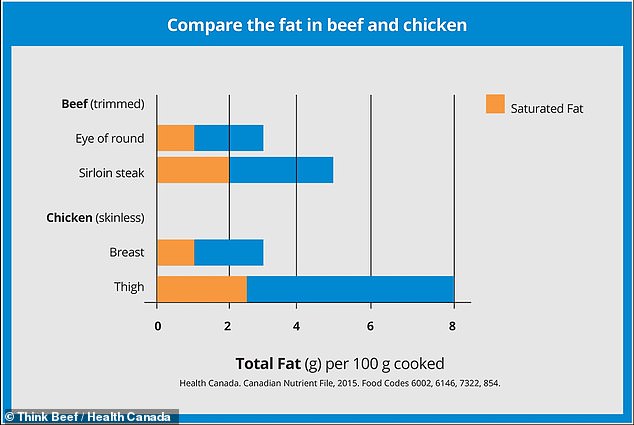It’s often touted as the healthier meat choice and America’s most popular protein, but a new study suggests chicken may not be as good for you as we once thought.
Researchers from Italy found people who eat more than about 19 bites (or four servings) of chicken per week are more likely to die from any cause than those who eat less than 100 grams weekly.
Additionally, the study appears to have found a concerning link between eating too much chicken – generally considered healthier than red meat because it’s lower in saturated fat and cholesterol – and gastrointestinal cancers.
The findings suggest those eating more than 300 grams weekly had double the risk of an early death from digestive system cancers – for men, that risk was even higher.
It’s unclear why consuming just 19 bites of chicken may increase cancer risk, but the researchers have several theories.
They suspect overcooking chicken may create high levels of ‘mutagens’ – chemical or physical substances that cause genetic mutations – or that the way chickens are raised and fed could contribute to cancer risk.
For example, some studies suggest eating chicken exposes the human body to carcinogenic pesticides and hormones present in their feed.

A new study suggests eating just 19 bites of chicken per week could increase your risk of dying by nearly 30 percent
To investigate a potential link between chicken and early death, researchers from the National Institute of Gastroenterology in Italy collected data on the diets of 4,869 adults, then tracked their health for 19 years.
Each participant provided information about their demographic background, general health status, lifestyle habits and medical history through interviews with the researchers.
The team also recorded their weight, height and blood pressure, and asked them to complete a research-backed questionnaire about their eating habits.
The survey included questions about how much red meat, poultry and total meat the participants ate, and this data was sorted into four intake levels per protein type.
Over the course of the observation period, the researchers kept track of who died.
Of the 1,028 participants who died, white meat accounted for roughly 41 percent of their weekly meat intake, and 29 percent of that was poultry. The remaining 59 percent was red meat.
The researchers used statistical analysis to look for a link between poultry consumption and mortality, eliminating the role of other factors such as age, sex and health conditions.
The results, published in the journal Nutrients, suggested eating more than 300 grams of chicken per week was associated with a 27 percent increased mortality risk from any cause compared to eating less than 100 grams per week, the study states.

Research by Health Canada shows the different fat concentrations in chicken versus beef, suggesting that chicken may not always be the leaner choice after all

The findings suggest that those eating more than 300 grams weekly had more than double the risk of early death from digestive system cancers — and for men, the risk was even higher
What’s more, the researchers found the risk increased as the portion consumed increased, and was higher compared to eating the same portion of red meat.
The risk was also higher for men than women.
The authors wrote: ‘Our results showed that men have a higher risk than women of dying from [gastrointestinal cancer] for the same proportion of poultry consumed.’
Specifically, men who consumed more than 300 grams of poultry per week were 2.6 times more likely to die from digestive cancer than those who ate less than 100 grams. For the general study population, the risk was only 2.27 times greater.
The researchers aren’t sure why that is the case, as there is ‘no known biological mechanism to explain the observed sex differences,’ they wrote.

The study’s findings suggest men who eat more than 300 grams of chicken per week are more likely to die early than woman who eat the same amount
But differences in sex hormones may play a role. The study points to previous research in mice that suggests estrogen, a female sex hormone, may influence the ability to metabolize nutrients as well as the risk of developing certain diseases.
The researchers note, however, that ‘further investigation is needed to support this hypothesis,’ and that general dietary differences between men and woman could also play a role, as women tend to prefer smaller portions and healthier foods.
Despite the study’s alarming findings, the researchers did find some evidence to support the idea that poultry is generally healthier than red meat.
Higher consumption of red meat was observed among participants who died from non-digestive cancers. Red meat made up 64 percent of weekly meat intake for those that died of these diseases.
The study authors noted the research had several limitations, including that the questionnaire the team used did not ask about different cuts of meat, processed poultry consumption, how the poultry was prepared, which may influence health outcomes.
The researchers also did not collect data on participants’ exercise habits, which plays a critical role in overall health and prevention of early death.
It’s also important to note observational studies like this one cannot establish a direct relationship – these findings only point to a possible link between poultry consumption and early death.
But the study adds more data to a conflicting body of research on this topic. While some previous studies have identified a similar link between poultry overconsumption and increased risk of early death and cancer, others have found the opposite — or no link at all.
Red meat, however, has been linked to many poor health outcomes, including heart disease, cancer and type 2 diabetes.
Thus, chicken has long been touted as the healthier meat, but this study raises new questions about this claim.
More research is needed to determine exactly how eating poultry affects health — an important question as chicken consumption continues to rise in the US.







